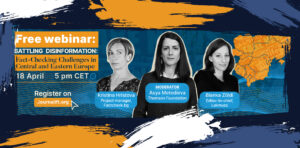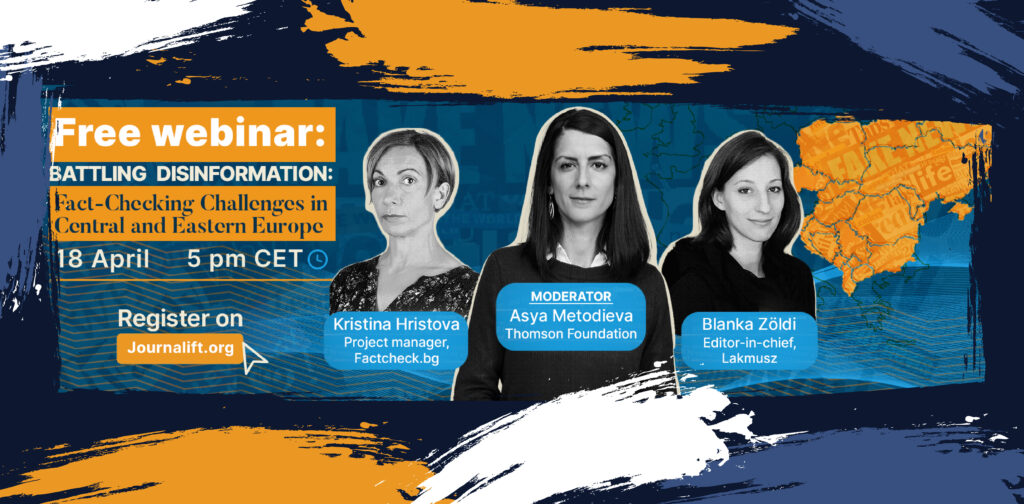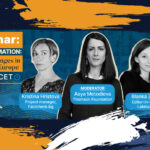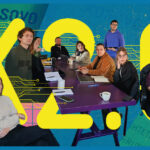Improving the business models of local media in the Western Balkans and testing new sources of income at a time when the state of media freedom has never been worse, and the media itself is virtually invisible in media markets, seems like an ‘impossible mission’. But the Media for All project and the Thomson Foundation as its key partner in the area of business media support believed that there are ways and modalities of support that will help professional local media develop.
Local media is an important source of information for local communities, whether they live in the Western Balkans or have moved outside of their countries’ borders thus making up numerous members of diasporas from the Balkans.
The project team sought to meaningfully improve their digital presence, to test new business ideas, to improve the knowledge and skills of their professional staff, to advance both the production and quality of content and information and – in general – to make these media more competitive in their local communities and to build or improve the relationship of trust with their audience.
Among the most important mechanisms of program support for our media partners with training – group and individual, development grants and online learning (e-learning), continuous and dedicated mentoring has proven to be one of the keys for successful media work and results that supported the outcome.
Is there a recipe for success?
There is no unique recipe for successful mentoring work that would yield equal results and success in different contexts, with different media, diverse business ideas, and specific dynamics of relationships and communication. Mentors, as well as the programs with which they cooperate, always adapt to the media, or any other clients with whom they work. It is possible, however, to list several ingredients in this magical mentoring formula of success, which defined mentoring work coordinated by the Thomson Foundation.
One of our mentors reflects on his personal experience, and also shared impressions of how the whole process went in his Journal.
As part of the Media for All project, the Thomson Foundation runs the Media Accelerator – a regional support program for the development of business ideas with a focus on local and less developed media, i.e. media whose mission, focus and content are specific (so-called niche media), such as minority media, non-profit media, media that are profiled as investigative or focused on topics such as the economy, etc.
Building trust was the key to mentoring work on developing and testing business ideas during the initial three months of support – from November 2020 to the end of January 2021. Given the number of media outlets (59 media outlets), participants in the process (over 100), the number of mentors (29) and the modality of the work – which was online because of the restrictive measures that were in force during that period because of COVID-19 – needed to protect the autonomy of the process and enable both sides – the media itself as well as the mentoring pool that represented the extended hand of the project team – to be as committed to the work as possible.

After evaluating the quality of business plans made by the project team, 55 of the 59 media outlets received financial support for their implementation through grants between March 2021 and April 2022. To illustrate the success of this process, and the adaptability of the projects, I will only mention that we initially planned to work with 36 media outlets (and we worked with 59 in total) and that the budget for investment grants was increased from £750,000 to £1.26 million.
We continued with the mentoring support during the implementation of business plans, through a system of monitoring media progress and achieving the objectives of business plans, which we developed together with grant managers of the British Council.
Mentors
| Within the 'Media for All' project, the Thomson Foundation works with 29 professionals – 12 women and 17 men. They come from 10 different countries, not only the Western Balkans but the European Union as well. They bring a variety of expertise in the fields of media development, journalism, business, higher education and research. Pairing mentors with media teams took into account, in addition to the above expertise, the business ideas proposed by the media at the beginning of the process as well as the context within which these media work. In some cases, and there is an example of Albania, language knowledge was one of the criteria for match making. Due to the complexity of the process in each of the six countries in the region, we had one coordinator who, along with mentoring duties, had additional tasks in order for the entire mentoring process to go according to plan, and the exchange of experience between the TF team, mentors and the media was maximised. |
Trust is the key. It's a train that only passes once...
It is not without reason that one evergreen quote says that "there is a train that passes only once in a lifetime ... it is called trust". Is there a more important factor that determines and influences human relationships, communication and joint, team, work? It seems not. In the business environment, businesses, and even media development – the sector to which our engagement is closest – trust has become a magic formula and a key concept (even buzzword) that is aspired to, and without which it is impossible.
“The best thing happened in our mentorship work is that we gained a friend, first of all, and then a mentor who has knowledge, experience and skills unconditionally shared.”
Building trust at the level of the project team and their partners or clients, in this case – local and regional media – is a key prerequisite for success and final results.
The 29 mentors who worked with 59 media partners during the four-month period in which they worked together to create business plans and budgets managed with their open approach, integrity and availability to gain media trust. Without that essential 'ingredient', there would be no magic created around our relationships, nor would there be results and extreme satisfaction.
Knowledge and expertise. Support beyond expectations.
Mentoring does not just mean expertise in a particular field. It is much more demanding in nature and implies professional, personal and pedagogical qualities. But the knowledge - especially the one applicable in practice - that our mentoring pool has offered to the media in their daily communication is one of the most valuable resources.
“Our mentor has happened to be very knowledgeable especially regarding online content and digital advertising. His assistance resulted in an increased number of social media subscriptions and webpage visits exceeding our expectations.”
The way in which knowledge was shared and later generated changes in the way of thinking and working in the media themselves, is an immeasurable contribution to the development of these professional media. Whether it is specific areas – media economics, IT, community engagement, digital marketing, etc. – or defined topics, mentors have selflessly shared it with the media making them, themselves, and made our entire program richer for a new experience.
Simplicity and dedication. We all have one team.
“Working with a mentor is perfect. He even goes beyond mentoring and acts like a real part of the team. We overcame the formal meetings outlined in the project rules. We communicate almost on a daily basis, he is involved in all activities.”
Building trust between mentors and the media was the key to success, but the added value of the whole process was reflected in the commitment of many mentors to the work and support of media teams. Often their engagement went beyond the contractual relationship, which in theory is easy to define through a list of specific activities and services – the so-called Job Description or Scope of Work. However, the practice has shown that it is much more fluid and unpredictable, and the TF mentoring team reacted to that adequately and proactively. Related to this is the next characteristic of good mentoring, flexibility.

Flexibility is a virtue. Nothing is set in the stone.
Regular and open communication characterised the relations of the TF team with the mentoring group, as well as the media, which are the end users of our support. This allows us all to jointly identify gaps, problems and obstacles to the smooth running of activities, but also – most importantly – actively seek solutions and adapt to the real needs of the media and their business plans.
“During all this period our mentor was available for every question and every misunderstanding that we had. He was very warmly and friendly with us, so we weren’t shy to ask him some stupid questions. He clarified everything and helped us to understand our assignments and to fill in the task.”
This flexibility and the ability to adapt to the current situation, and the challenges that arise unexpectedly, is another value of the mentoring process within the 'Media for All' project. Our mentors have shown that with indisputable knowledge, they are able to convey it in an adapted way, with a large dose for every question and doubt, and sometimes even the non-responsiveness of the media themselves.
Vision, direction and influence. Let's look ahead, not backwards.
Mentors who directed the media towards the most optimistic business solutions and models are visionaries, professionals and people who adorn exceptional human virtues. Experience showed that their flexibility, as well as the flexibility of the entire TF team and the adapted approach that arose from it, was the key to results and mutual satisfaction.
“The best thing that happened to us while working with her was that she pushed us out of our own comfort zone and encouraged us to set significantly higher goals than originally planned.”
One of the biggest challenges facing this media support programme was the mentality, so rooted among representatives and media representatives who are used to working with donors, that has significantly hampered them from thinking differently, to be innovative and to boldly explore their borders and other solutions.
Thanks to the flexible relationship of the group of mentors with whom we worked, relationships of trust and authority based on their knowledge and experience, we were able to encourage the media to think differently. And that they're not afraid of the changes this experience will bring, and the mistakes they're necessarily going to make. But from which they will draw valuable experiences and knowledge.

We've learned a lot. That's why we share that experience with you.
Unique professional experience, based on sincere human relations and trust, solidarity and active transfer of knowledge, brought by this mentoring program, has also led us to think actively about all the lessons learned from the Media for All project which produced additional value. Instead of drawing conclusions, I hereinafter present the most important lessons learned:
- Mentoring is very important for professional and personal development, and contributes to the long-term way media teams rethink their business, relationship with the audience and mission,
- It is important to ensure that in mentoring programs, except those that produce content, participate also decision-makers, be it editors, management, and sometimes representatives/media ownership structures,
- Mentoring is also important as an accompanying activity that helps media teams better understand complex business concepts and approaches (such as targeting, Business Canvas, revenue verification), and start testing them in practice and thus exiting their comfort zone,
- Mentoring needs to be introduced in the early stages of planning, already during the wording of business ideas, which was not the case in our project,
- Besides early stages, when ideas and phases of business plans are defined, the practice shows that mentoring is extremely important in the phase of implementation of business plans where continued support for media teams is extremely valuable to them,
- Synergy created through dynamic communication and support between mentors, media and project team generates and results of new knowledge and experience, identifies innovative and good practises and opportunities for cooperation that outpace the project itself,
- The aforementioned relationship dynamics and synergy of knowledge and trust need to be continuously maintained through different channels that are not just classic online meetings, meetings or workshops, or project-defined activities in general. Therefore, the TF team has launched the Journalift e-learning platform but also a place that will gather knowledge, spread good stories and share learning and progress resources, making it a place for further generation of that energy.































